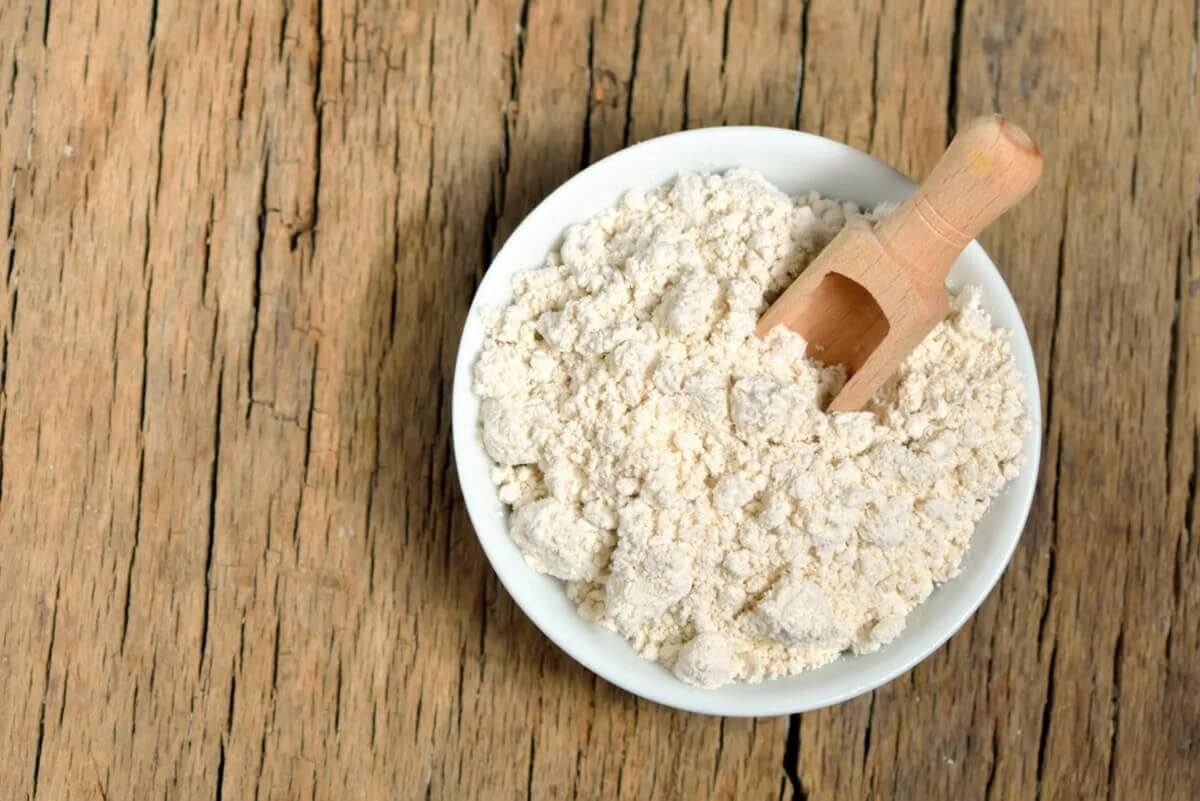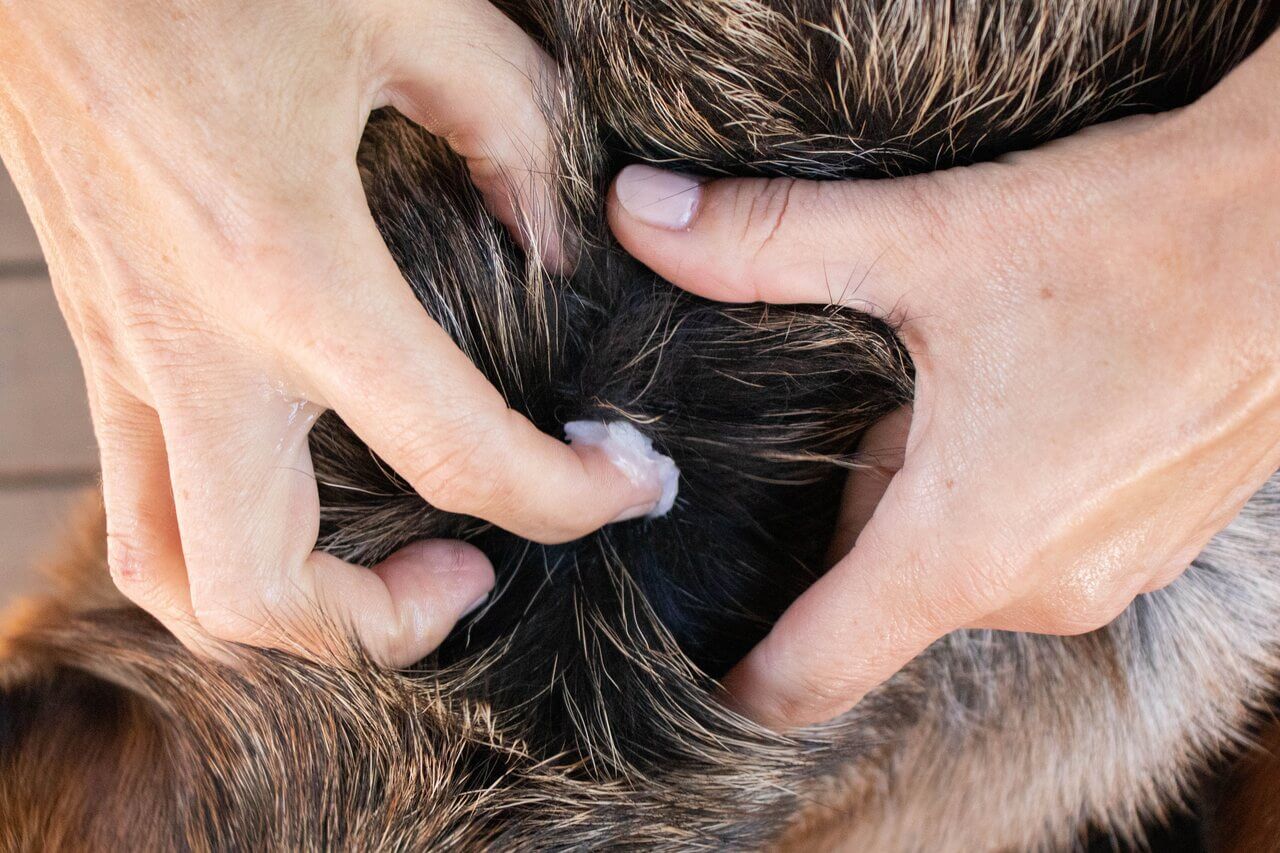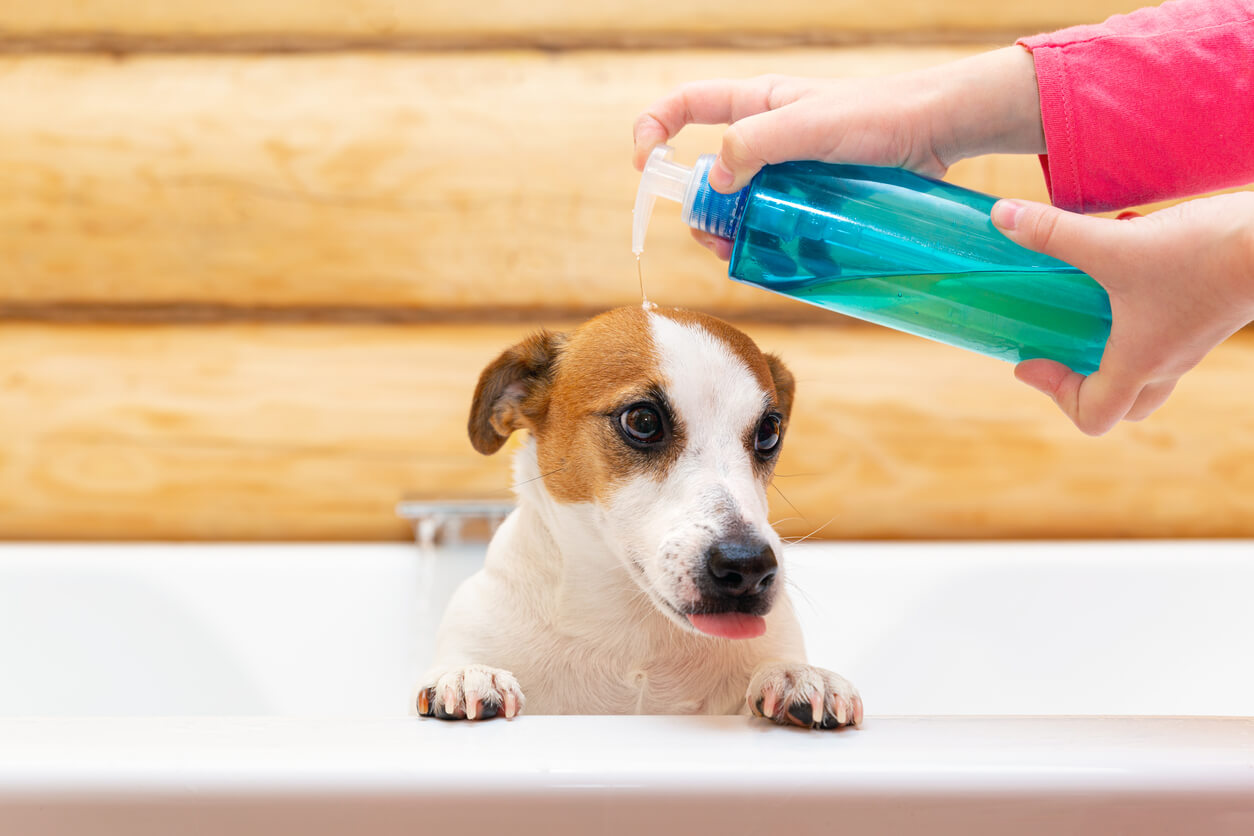5 Home Remedies for Excessive Scratching in Dogs

When dogs have itchy skin, they try to get relief by rubbing, licking, or chewing the affected area. The action can be compulsive, so it’s natural for owners to develop anxiety at the sight of their furry friend scratching. In some cases, you can control the urge by using home remedies for excessive scratching in dogs, such as chamomile, cold compresses, and coconut oil.
First of all, you should know that there are many causes behind this phenomenon. It can manifest itself in a mild, moderate, or severe form. In the latter cases, it’s accompanied by hair loss and open wounds. Therefore, we advise you to consult your veterinarian beforehand to prioritize the welfare of your dog above all else.
Causes of excessive scratching in dogs
Dogs scratch excessively due to different factors that can be both internal and external. Knowing the reason for scratching, as well as alleviating it, is essential to ensure your pet’s well-being and health. After all, constant friction can lead to skin lesions that compromise their health.
Although the causes of itching in dogs are highly variable, here’s a list of the most common ones:
- Allergies: Dogs can experience adverse reactions to different elements found in their environment. The most common allergies in dogs are to food, flea bites, pollen, dust, certain household cleaners, and dust mites.
- Infections: These can range from bacteria, fungi, and other microorganisms that, when they reproduce in an uncontrolled manner, generate inflammation, redness, and intense itching.
- Dryness: This can be caused by environmental factors, such as excessive heat or humidity, poor quality food, frequent bathing, or use of products not indicated for use in animals, such as certain soaps or shampoos.
- Bites: They can be from fleas, ticks, mites, mosquitoes, and other parasites that feed on blood. All of them bite your dog to obtain food, and this simple act causes a great amount of itching in the animal. As a consequence, it can lead to acral dermatitis in dogs.
- Other causes: Genetics, stress, anxiety, lack of play, and other internal diseases can explain the behavior. All of these lead to the canine releasing tension by frequent scratching and licking.
Given the spectrum of conditions that may be behind excessive scratching in your furry friend, it’s ideal to consult your veterinarian as soon as you detect it.
Therefore, this professional can identify the underlying cause and, based on that, administer treatment for itching and scratching in the dog. As a palliative option, especially when it comes to mild cases, you can consider some home therapies.
The best home remedies for excessive scratching in dogs
Now that you know why canines scratch, it’s time for you to get to know some natural remedies that can provide relief. Keep in mind that they’re palliative; therefore, they don’t replace the consultation with the veterinarian and, much less, the therapy indicated by the professional after diagnosis.
1. Colloidal oatmeal

Well known for its benefits for human skin, it also offers benefits for the skin of your furry friend. Thanks to its moisturizing, soothing, anti-inflammatory, and cleansing properties, it’s emerging as a home ingredient to combat canine itching. You can use it in two ways:
- Oatmeal mask: Just mix a little oatmeal with water until you get a thick paste consistency. This is applied on the irritated, inflamed, or reddened skin and left to act for a few minutes before rinsing.
- Oatmeal bath: Before bathing your dog, mix some oatmeal or oat flakes with warm water and then soak your dog in the bathtub for 10 to 20 minutes.
2. Chamomile

This plant has very interesting soothing and healing properties. On the skin, it has a moisturizing, soothing, and anti-inflammatory effect. How can you use it? Simply prepare an infusion and let it cool. Then, apply it on your dog’s skin with the help of a cloth or cotton.
Another alternative is to make baths to relieve itchy skin in dogs. To do this, fill the bathtub with warm water and leave some tea bags in it for a few minutes. Then, just remove them and submerge your dog in the water for soothing benefits. Like other home remedies for itching in dogs, this is a palliative therapy.
3. Coconut oil

The American Kennel Club Pet Insurance endorses this remedy to help soothe skin that’s irritated or dry. It’s an ingredient that comes in handy for massaging and having a moment of relaxation and calm with your furry friend.
The only recommendations are that it should be free of additives or fragrances, and you should be careful with the amount you use.
Likewise, you must prevent your pet from ingesting it by licking or biting the affected area. One of the ways to achieve this is through alternatives to the Elizabethan collar, such as surgical recovery shirts or sleeves. All this helps avoid a gastrointestinal reaction after ingestion.
To use, put the coconut oil in the refrigerator to become completely solid. Once this appearance is reached, apply it on your dog’s skin through soft massages.
4. Cold compresses

This is one of the simplest home remedies for excessive scratching in dogs. It’s very useful for relieving skin reactions that occur from insect bites, such as the following:
- Inflammation
- Local irritation
- Redness
To do this, you just need to wrap a few ice cubes in a thick cloth or towel. Then, proceed to apply it to the affected area. It’s important that you do this for 10 to 15 minutes to prevent further skin lesions and discomfort in your pet due to the action of the cold itself
5. Special shampoos

In cases of canine atopic dermatitis, your companion can get relief through a mild, non-irritating shampoo and warm water. As reported in BMC Veterinary Research, bathing with an emollient shampoo containing lipids, complex sugars, and antiseptics has a modest antipruritic effect in canines with this condition.
Ask your veterinarian which shampoo you can purchase, and unless they give you other instructions, bathe your dog with it once a week. Depending on your dog’s skin, you can consider anti-seborrheic and antiseptic shampoos.
Tips to relieve itching and scratching in dogs
Home remedies help relieve your dog’s itching. As a complement, it’s essential that you maintain good hygiene and care habits on a daily basis, such as the following:
- Hygiene: Of the room, blankets, and all items your dog comes in contact with. Inspect for fleas, mites, and other parasites that may cause your dog to scratch excessively.
- Diet: Feeding your pet a balanced and adequate diet helps to improve the condition and quality of the skin and coat.
- Nutritional supplements: Such as omega-3 and omega-6, which help reduce inflammation, improve the immune system to avoid certain allergies and, ultimately, maintain skin health.
Prioritize your pet’s well-being
These home remedies for excessive scratching in dogs are useful, simple, and easy to implement at home. However, they’re meant for temporary relief and aren’t a substitute for seeing a veterinary professional. If you notice that the scratching persists, worsens, or isn’t relieved, or there are other lesions, it’s time to go for consultation to have a timely diagnosis and treatment.
When dogs have itchy skin, they try to get relief by rubbing, licking, or chewing the affected area. The action can be compulsive, so it’s natural for owners to develop anxiety at the sight of their furry friend scratching. In some cases, you can control the urge by using home remedies for excessive scratching in dogs, such as chamomile, cold compresses, and coconut oil.
First of all, you should know that there are many causes behind this phenomenon. It can manifest itself in a mild, moderate, or severe form. In the latter cases, it’s accompanied by hair loss and open wounds. Therefore, we advise you to consult your veterinarian beforehand to prioritize the welfare of your dog above all else.
Causes of excessive scratching in dogs
Dogs scratch excessively due to different factors that can be both internal and external. Knowing the reason for scratching, as well as alleviating it, is essential to ensure your pet’s well-being and health. After all, constant friction can lead to skin lesions that compromise their health.
Although the causes of itching in dogs are highly variable, here’s a list of the most common ones:
- Allergies: Dogs can experience adverse reactions to different elements found in their environment. The most common allergies in dogs are to food, flea bites, pollen, dust, certain household cleaners, and dust mites.
- Infections: These can range from bacteria, fungi, and other microorganisms that, when they reproduce in an uncontrolled manner, generate inflammation, redness, and intense itching.
- Dryness: This can be caused by environmental factors, such as excessive heat or humidity, poor quality food, frequent bathing, or use of products not indicated for use in animals, such as certain soaps or shampoos.
- Bites: They can be from fleas, ticks, mites, mosquitoes, and other parasites that feed on blood. All of them bite your dog to obtain food, and this simple act causes a great amount of itching in the animal. As a consequence, it can lead to acral dermatitis in dogs.
- Other causes: Genetics, stress, anxiety, lack of play, and other internal diseases can explain the behavior. All of these lead to the canine releasing tension by frequent scratching and licking.
Given the spectrum of conditions that may be behind excessive scratching in your furry friend, it’s ideal to consult your veterinarian as soon as you detect it.
Therefore, this professional can identify the underlying cause and, based on that, administer treatment for itching and scratching in the dog. As a palliative option, especially when it comes to mild cases, you can consider some home therapies.
The best home remedies for excessive scratching in dogs
Now that you know why canines scratch, it’s time for you to get to know some natural remedies that can provide relief. Keep in mind that they’re palliative; therefore, they don’t replace the consultation with the veterinarian and, much less, the therapy indicated by the professional after diagnosis.
1. Colloidal oatmeal

Well known for its benefits for human skin, it also offers benefits for the skin of your furry friend. Thanks to its moisturizing, soothing, anti-inflammatory, and cleansing properties, it’s emerging as a home ingredient to combat canine itching. You can use it in two ways:
- Oatmeal mask: Just mix a little oatmeal with water until you get a thick paste consistency. This is applied on the irritated, inflamed, or reddened skin and left to act for a few minutes before rinsing.
- Oatmeal bath: Before bathing your dog, mix some oatmeal or oat flakes with warm water and then soak your dog in the bathtub for 10 to 20 minutes.
2. Chamomile

This plant has very interesting soothing and healing properties. On the skin, it has a moisturizing, soothing, and anti-inflammatory effect. How can you use it? Simply prepare an infusion and let it cool. Then, apply it on your dog’s skin with the help of a cloth or cotton.
Another alternative is to make baths to relieve itchy skin in dogs. To do this, fill the bathtub with warm water and leave some tea bags in it for a few minutes. Then, just remove them and submerge your dog in the water for soothing benefits. Like other home remedies for itching in dogs, this is a palliative therapy.
3. Coconut oil

The American Kennel Club Pet Insurance endorses this remedy to help soothe skin that’s irritated or dry. It’s an ingredient that comes in handy for massaging and having a moment of relaxation and calm with your furry friend.
The only recommendations are that it should be free of additives or fragrances, and you should be careful with the amount you use.
Likewise, you must prevent your pet from ingesting it by licking or biting the affected area. One of the ways to achieve this is through alternatives to the Elizabethan collar, such as surgical recovery shirts or sleeves. All this helps avoid a gastrointestinal reaction after ingestion.
To use, put the coconut oil in the refrigerator to become completely solid. Once this appearance is reached, apply it on your dog’s skin through soft massages.
4. Cold compresses

This is one of the simplest home remedies for excessive scratching in dogs. It’s very useful for relieving skin reactions that occur from insect bites, such as the following:
- Inflammation
- Local irritation
- Redness
To do this, you just need to wrap a few ice cubes in a thick cloth or towel. Then, proceed to apply it to the affected area. It’s important that you do this for 10 to 15 minutes to prevent further skin lesions and discomfort in your pet due to the action of the cold itself
5. Special shampoos

In cases of canine atopic dermatitis, your companion can get relief through a mild, non-irritating shampoo and warm water. As reported in BMC Veterinary Research, bathing with an emollient shampoo containing lipids, complex sugars, and antiseptics has a modest antipruritic effect in canines with this condition.
Ask your veterinarian which shampoo you can purchase, and unless they give you other instructions, bathe your dog with it once a week. Depending on your dog’s skin, you can consider anti-seborrheic and antiseptic shampoos.
Tips to relieve itching and scratching in dogs
Home remedies help relieve your dog’s itching. As a complement, it’s essential that you maintain good hygiene and care habits on a daily basis, such as the following:
- Hygiene: Of the room, blankets, and all items your dog comes in contact with. Inspect for fleas, mites, and other parasites that may cause your dog to scratch excessively.
- Diet: Feeding your pet a balanced and adequate diet helps to improve the condition and quality of the skin and coat.
- Nutritional supplements: Such as omega-3 and omega-6, which help reduce inflammation, improve the immune system to avoid certain allergies and, ultimately, maintain skin health.
Prioritize your pet’s well-being
These home remedies for excessive scratching in dogs are useful, simple, and easy to implement at home. However, they’re meant for temporary relief and aren’t a substitute for seeing a veterinary professional. If you notice that the scratching persists, worsens, or isn’t relieved, or there are other lesions, it’s time to go for consultation to have a timely diagnosis and treatment.
All cited sources were thoroughly reviewed by our team to ensure their quality, reliability, currency, and validity. The bibliography of this article was considered reliable and of academic or scientific accuracy.
- Dean, M. (2 de marzo de 2022). 5 Natural Remedies to Help Your Itchy Dog. American Kennel Club Pet Insurance. https://www.akcpetinsurance.com/blog/5-natural-remedies-to-help-your-itchy-dog
- Olivry, T., DeBoer, D. J., Favrot, C., Jackson, H. A., Mueller, R. S., Nuttall, T., Prélaud, P., & International Committee on Allergic Diseases of Animals. (2015). Treatment of canine atopic dermatitis: 2015 updated guidelines from the International Committee on Allergic Diseases of Animals (ICADA). BMC Veterinary Research, 11, 210. https://www.ncbi.nlm.nih.gov/pmc/articles/PMC4537558/
This text is provided for informational purposes only and does not replace consultation with a professional. If in doubt, consult your specialist.








